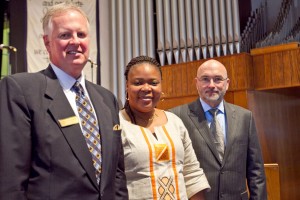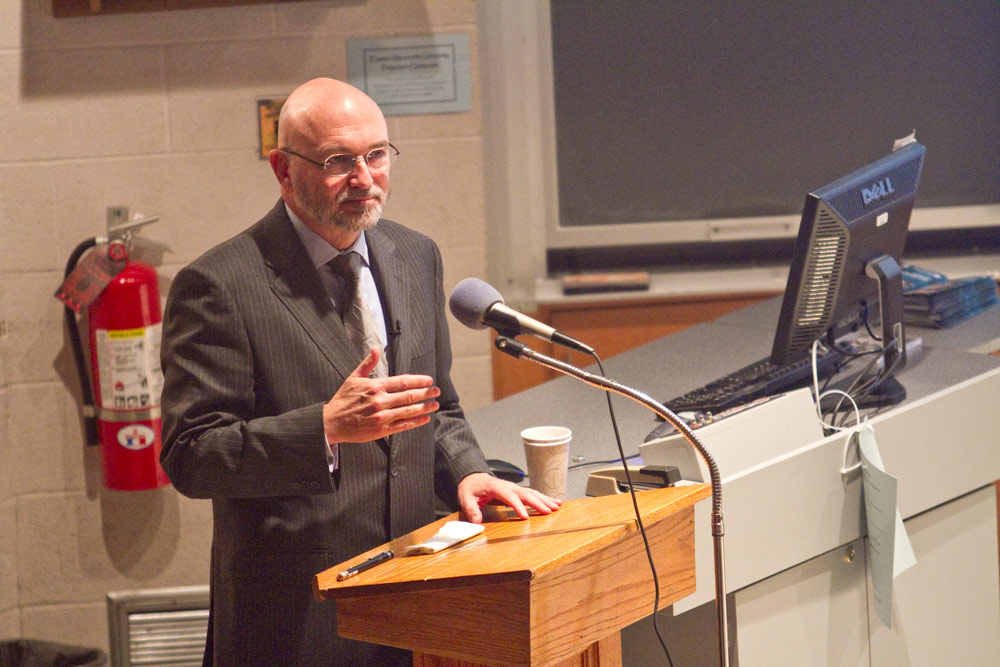This article appears in Crossroads magazine, fall 2011 supplement
When the state of Georgia needed someone to rescue its troubled system for mentally ill and disabled individuals, it hired Frank Shelp ’80. In May 2009, Georgia named Shelp to be its first-ever commissioner of its newly formed Department of Behavioral Health and Developmental Disabilities, charged with the well-being of 120,000 individuals, 2,000 of them in hospitals.
Shelp, a psychiatrist who holds multiple degrees, knew the work would be challenging. In 2007, The Atlanta Journal-Constitution ran a series of investigative articles on Georgia’s underfunded psychiatric hospitals, holding the system responsible for more than 100 deaths from 2002 though 2006. These newspaper articles attracted the attention of the U.S. Department of Justice, which did its own multi-year investigation and concluded that “preventable deaths, suicides and assaults continue to occur with alarming frequency in the hospitals.”
Shelp’s remediation efforts in his first year on the job impressed the U.S. Department of Justice sufficiently to cause it to withdraw its lawsuit against the state for violating the civil rights of the people it was supposed to be caring for.
The foregoing facts about Shelp and his cabinet-level position in Georgia have been widely reported in the media in Atlanta and elsewhere in the state.
What has not been reported is the path Shelp took from his own troubled childhood home in New England through what was then Eastern Mennonite College to arrive at his current position of immense responsibility. It requires him to combine compassion, medical knowledge, and organizational acumen to head an agency with an annual budget of $1 billion.
Shelp grew up in Colchester, Connecticut, in a family consisting of a younger sister, a mother with fragile
mental health, and a Navy-serving father who was away from home for months at a time as a non-commissioned officer on submarine duty.
Shelp somehow made it to college in Kansas in 1973, but had to drop out when his father sent his mother on an airplane to Shelp. By that act, his father announced his decision to wash his hands of his wife’s deteriorating mental state. He took Shelp’s sister and moved out of the family home.
Shelp brought his mother back to Connecticut, got a job at a Christian bookstore, married, settled with others on a chicken farm, and became a father. Lacking a car, Shelp would ride his bicycle 14 miles one-way to work in the bookstore, regardless of the weather, season or amount of daylight.
At a national meeting of Christian booksellers in 1976, Shelp heard then-EMU president Myron Augsburger deliver an inspiring keynote speech. Shelp sought Augsburger’s counsel after the speech. Augsburger, known across America for his leadership as an evangelist, encouraged Shelp to consider
re-enrolling in college and invited him to visit EMU.
Borrowing a dilapidated VW Beetle, Shelp and his family drove to Harrisonburg where Augsburger showed them around the campus. The president told them that finances should not be viewed as an insurmountable barrier to getting an EMU education—ways and means could be found.
Enrolled in the fall of 1976, Shelp received tuition assistance from the college. For living expenses, he ran a bike shop, open Monday through Friday, 1 to 5 p.m., and all day on Saturday. Bikes were the family’s only transportation — “not because it was a groovy, hippy thing to do; it was raw necessity.” Shelp and his wife—towing the baby—biked to a co-op to buy grains, beans and other staples and to a dairy farm to buy milk.
Shelp recalls with gratitude that Augsburger stayed attuned to Shelp’s financial and personal struggles; Augsburger periodically passed along funds from his own pocket, quietly and with no expectation of repayment. Shelp double-majored in biology (earning a BS) and liberal arts (for a BA). Carrying a heavy load of classes, he graduated in three years of year-’round coursework.

Amid this staggering amount of responsibility—schoolwork, a business, parenthood—Shelp remained the caregiver for his desperately ill mother. Despite Shelp’s efforts to keep her safe in an apartment, his mother usually lived out of her car. She often disappeared for days until Shelp could locate her and retrieve her.
EMU’s classes were a bright spot in his life. “I will put my degrees and quality of education at EMU up against any one of my fellow graduate students from Harvard, Yale or any of the other Ivy League schools. I would not have done as well if I had graduated from any other school. It wasn’t just the academic preparation. It was the personal attention I received from the professors. That made the difference for me.”
Shelp managed to reach his final semester of college with only $3,000 in outstanding loans. He borrowed
another $3,000 just before graduation to position himself for settling his family in Richmond, Va., and beginning his graduate studies at the Medical College of Virginia.
While earning his medical degree from MCV, Shelp remained the conscientious son. He took his mother to Richmond, so that he could continue to look after her. She died of natural causes in his third year of medical school.
In 1988 at Duke University, Shelp completed a residency in psychiatry and geriatrics—familiar terrain for him, given 10 years of being his mother’s caregiver. In 2006, he earned an MPH in healthcare policy and administration at the University of North Carolina at Chapel Hill.
In his role as commissioner today, Shelp says he seeks to implement values similar to those he saw underpinning EMU in the late 1970s: respect for all and inclusiveness; meaningful service to society; integrity; and transparency in both finances and operations.
As the keynote speaker at the 2011 Homecoming banquet for donors, Shelp told hundreds of attendees: “Eastern Mennonite represents the greatest paradox in terms of its size versus its impact.” He applauded the way EMU asks students to go beyond acquiring knowledge and skills to pondering how they are going to use these assets to make a positive difference.
Since the early 1990s Shelp has chosen to thank EMU for enabling him to transform his life as a young adult by making a generous donation each year to its University Fund, the primary fund through which EMU provides financial assistance to undergraduate students.
